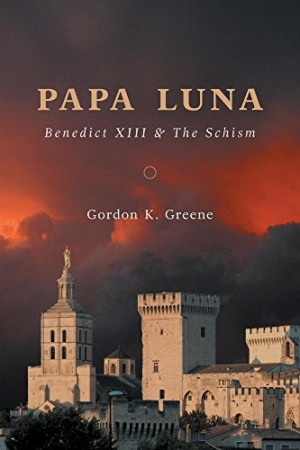
Papa Luna
Benedict XIII & The Schism
De Luna’s religious fervor is deeply felt, and his struggle to hold the church accountable to the teachings of Jesus, its own laws, and its responsibilities to the faithful is clearly rendered.
At the end of the fourteenth century, the Catholic Church was in turmoil; three men claimed to be the rightful pope. Gordon K. Greene’s Papa Luna is an exciting and enlightening fictionalized account that works to redeem the reputation of Pedro Martinez de Luna, whom it holds up as the rightful claimant to the papal throne.
Greene, a musicologist and author, was researching fourteenth-century European manuscripts when he became aware of Benedict XIII, or “Papa Luna.” De Luna struggled to unify the Church under one lawfully elected pope. Acting as a servant of God, he confronted greed, ethnic rivalries, and his adversaries’ lust for power, all against the backdrop of plague-ridden Europe’s Hundred Years’ War. The facts about de Luna compelled Greene to work to bring his claims to the papacy to light and redeem his reputation.
De Luna is presented as a man of integrity—not infallible, but honest, loyal, and faithful to his calling. A Catalan duke, he makes his mark as an expert in canon law, a respected university professor, and a papal legate who is both an exceptional statesman and passionate about the Church’s obligations to its followers.
The engaging story of his life is skillfully intertwined with revelations of the corruption rampant in both government and Church. Intrigue, betrayal, and hidden motives put de Luna’s mission and life in jeopardy, but his personal struggle and despair are lightened by the faith, love, and devotion of his loyal supporters and friends.
Excitement builds as de Luna, under siege, makes a daring escape with the help of his loyal servant Ramón, a secret member of the outlawed Knights Templar, to take refuge with supporters until he can plead his case before the Council of Constance in 1415. While logical and in accordance with Church law, his claim to be the rightful pope was denied.
Though it deals with complex historical situations and issues of canon law, the book remains exciting. Insightful and heartfelt fictional journal entries keep the narrative intimate and conversational. The text is beautifully written; it makes a strong case for de Luna’s right to the papal throne, defending him against the Church’s declaration, in effect to this day, that he was an “antipope.”
Supporting characters are believable. The vain, greedy, and prideful parade their egos on the chaotic world stage to great effect, while those who strive to act honorably are portrayed as warmly human and dedicated to seeing truth prevail despite the dangers they face.
De Luna’s religious fervor is deeply felt, and his struggle to hold the church accountable to the teachings of Jesus, its own laws, and its responsibilities to the faithful is clearly rendered. Rich, colorful descriptions; the addition of appropriate and convincing fictional scenes and characters; believable dialogue; and the insightful handling of emotions all work together to bring history to life in this perfectly paced tale.
Papa Luna not only provides insight into one of the most tumultuous periods in the history of the Catholic Church, it is a thrilling adventure story and a tribute to a good, though much-maligned, man who deserves a place of honor in Church history.
Reviewed by
Kristine Morris
Disclosure: This article is not an endorsement, but a review. The publisher of this book provided free copies of the book and paid a small fee to have their book reviewed by a professional reviewer. Foreword Reviews and Clarion Reviews make no guarantee that the publisher will receive a positive review. Foreword Magazine, Inc. is disclosing this in accordance with the Federal Trade Commission’s 16 CFR, Part 255.
